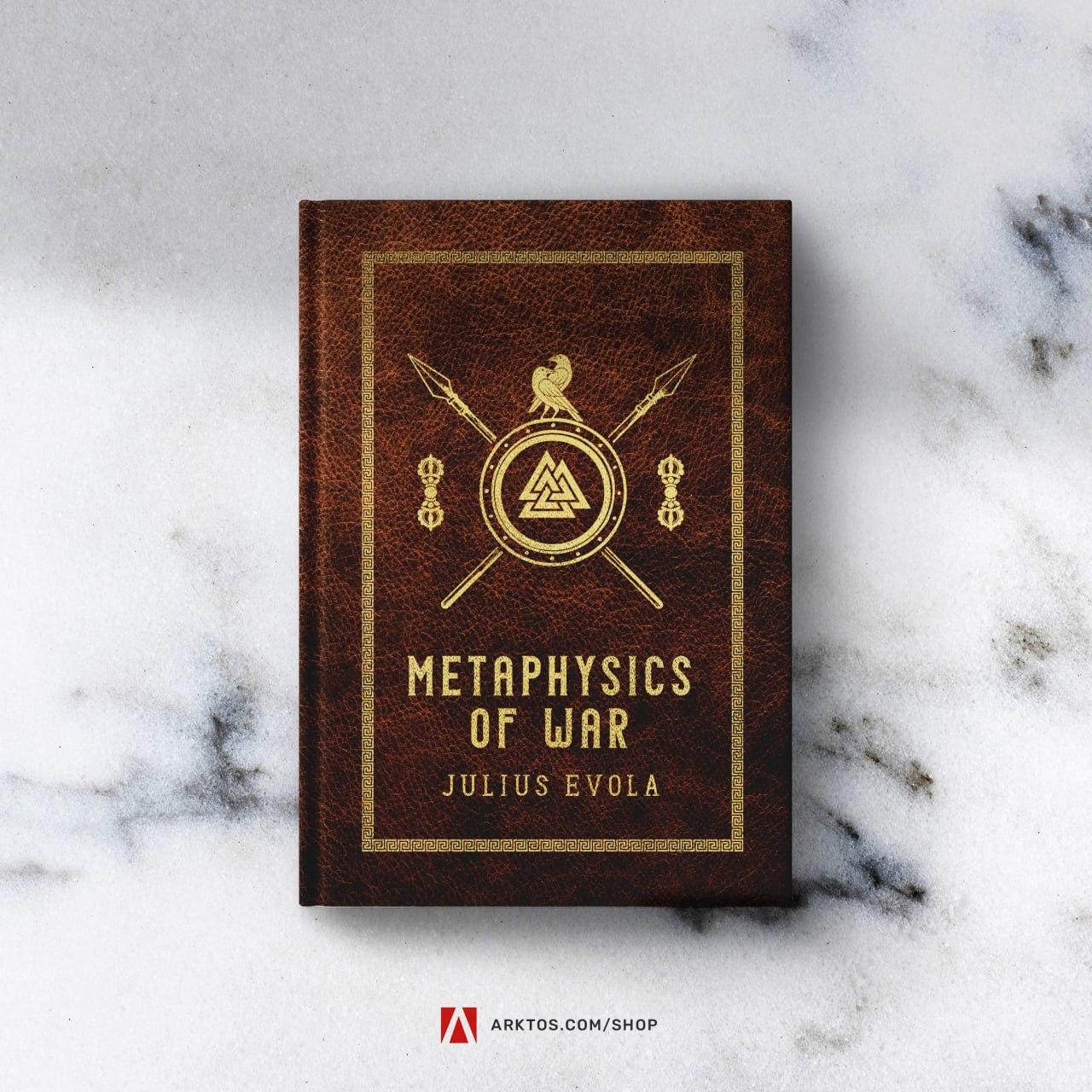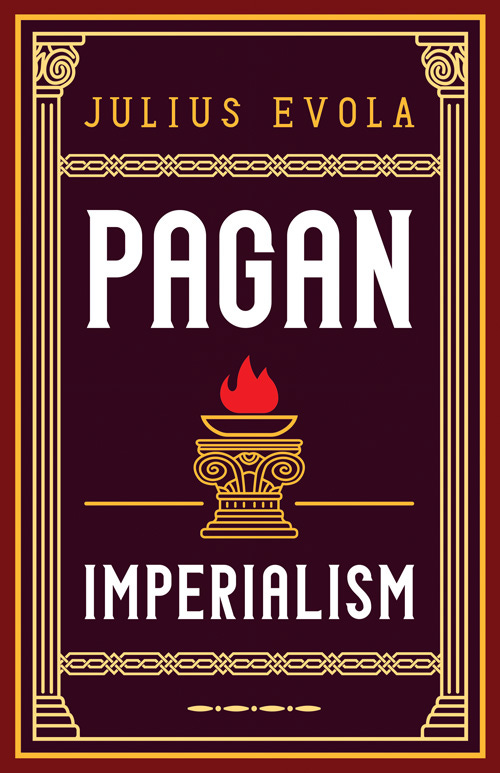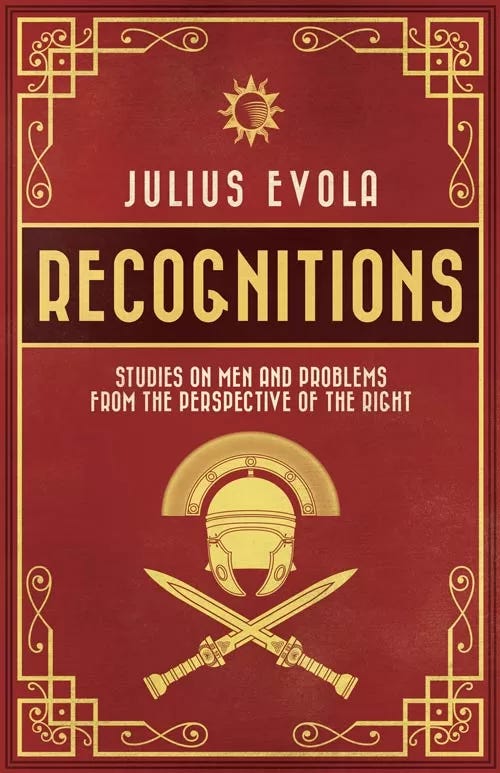Rethinking the Right - Part II
by Julius Evola
In this second installment of a series of Julius Evola’s meditations on the postwar Right, the Italian Traditionalist argues that the Right must grow beyond individualism and reactionary novelty in order to rediscover its historical and traditional roots, affirm its positive vision of the future, and embody the genuine culture it seeks not only to “conserve,” but to cultivate.
Perspectives of the Culture of the Right
It is quite in vogue today to speak of a “culture of the Right.” One cannot, however, easily banish the suspicion that all of this can be reduced to a “phenomenon of circumstance.” Given the advancement that the Right has enjoyed in the political field, one evidently wishes to put up some kind of cultural counterpart to that advancement. Yet this gives rise to various problems.
As a preliminary observation, the introduction of a political concept, like that of the Right, into the cultural field, does not seem very apropos. One should rather seek to move on the more concrete and objective terrain of a morphology of culture, by defining the orientation and the tasks proper to a given kind of culture. This all the more so, as it would be difficult for Italy to take inspiration from any tradition, and it is certainly not suitable to think that in the present republican and democratic climate the hoped-for culture might take on the characteristics of anything organically grown. Beyond all, it is necessary to come to terms with the concept of culture itself. Here one ought to distinguish three domains: that of spiritual formation, that of creativity (literature, novels, theater, in part film), and that of ideas and of doctrine. To which is added the problem of specifying the function of the culture that one has in mind, and its relations with sufficiently extensive strata of the population.
So far as the first domain goes, that is the creative domain, it little tolerates formulae and recipes, since every authentic and valid production depends essentially on the existence of a corresponding atmosphere. The inconsistency of any “on-demand,” commanded artistic creativity, was visible, for example, in the nullity of production in the so-called “Marxist” or “socialist realism” framework. One might always encourage, however, a certain production with an intrinsic character of protest. And thus the signs are inverted: while until now protest has been predominately the prerogative of the Left, today it ought to be conducted by the Right. Nor should one forget—as today one does forget—the great aristocratic protesters of yesterday, beginning with Friedrich Nietzsche, in those ideas of his which remain valid.
Classically, “culture” (see Cicero or Seneca) had the sense neither of erudition nor of intellectualism, but of spiritual and characterial formation of the person. In order to renew this meaning for a culture of the Right, the task arises of indicating models and human ideals in a formulation which assures them a normative value and a real suggestive force. Today there is truly a great need for people who do not chatter, nor “write,” nor argue, but who begin with being. Their authority and their prestige would come as a natural consequence, and the effects of this can otherwise be reached only with difficulty.
In the second domain—that of ideas and doctrines—it is both necessary and possible to specify, sector by sector, the content of a culture of the Right. Apart from this circumstantial appellation—“of the Right”—this means in essence making reference to intellectual orientations and preexisting criticisms which could be taken up again and developed further. The attack against Marxism is an obvious example, but to a certain degree it can be taken for granted. Those who yet hold to the threadbare dogmas of Marxism are rare: and if Marxism today constitutes a danger, it is not a danger on the cultural plane but essentially on the plane of practical politics, where not polemics but resolute action are needed to fight it. However the existence of a species of Marxian underworld cannot be ignored; it must be decisively unmasked and denounced.
A critique of science and scientism might partake of a culture of the Right, since the collusions between such views and Marxism are well known. The “demythification” of science is a very important task, and in a wider perspective it would be necessary to juxtapose, on the one hand, the positive contribution of science in the material sphere, and on the other the spiritual destruction derived from the scientific vision of the world.
One of the most important fields for the work of a culture of the Right is historiography. It is a fact that we of the Right have almost without exception written historiography in the anti-traditional, Masonic-liberal and more or less “progressivist” key. The so-called “fatherland history,” and not only its most stereotypical form, is characterized by its emphasizing and exalting as “our” history all that which in the past had a predominately anti-traditional character, departing from the very revolt of the Commons against imperial authority, up to those aspects of the Risorgimento which had undeniable relations with the ideas of ’89, and, finally, to Italy’s intervention in the First World War. Something of the kind must be said, not only for “fatherland history,” but also for history more generally.

Here, unfortunately, we are lacking our own tradition, our own antecedents to take up once more and to develop. It is useless for us to strain ourselves in looking for them. Some have uttered the names Machiavelli and Vico, whom we cannot imagine bringing into this context, since they treated of diverse and limited material. From Vico one might infer at most the interpretation of history in a regressive sense, the descent of civilizations from their once proper level, to the level of what he called the “heroic peoples,” and thence toward barbarism. But in Vico this is connected with the theory of cycles and historical “occurrences and recurrences.” Something analogous counts also for the more up-to-date theories of Oswald Spengler, with his “twilight of the West.”
We really do not know what one might possibly take from Machiavelli for a historiography of the Right. And historiography aside, we must advance precise reservations against those who would like generally to bring Machiavelli back into “our fold,” as one of the thinkers of the right. Not by chance did Machiavelli lend his name to “Machiavellianism,” and even leaving aside the more trivial aspects of this notion—namely the unscrupulous use of means toward reaching a given end—we will take this occasion to say that we do not feel at all like defining, as a piece of the Right, the mere “strong style” of a power which trenchantly affirms itself, when this power is formless, devoid of any higher anointment or superior legitimization. Otherwise we risk having to include not a few regimes from behind the Iron Curtain in our assessment of what belongs to the Right. Here one should consider, for instance, the phenomenon of a plenipotentiary dictatorship. In this respect, Ancient Rome’s point of view seems to us the just one, which considered dictatorship only for situations of emergency rather than as a permanent institution: for otherwise Rome would have confounded itself with the tyrants of Magna Graecia. With reference to current events, we might think analogously of the “strong regimes,” the authoritarian regimes of Spain and Greece, while fully recognizing their contingent raison d’être.
For the Right’s consideration of history in general (apart from indications to be found in a Burke, in a Butler, in a Tocqueville and in a Maistre—indications which, however, one must develop in view of a changed world) the unique valid contribution known to us is the book of L. de Poncins and E. Malynski, entitled The Occult War and translated also into Italian. It is illuminating in its indication of the the processes, often unfolding behind the scenes of history, which have led to the dismemberment of the traditional European world. Unfortunately, its exposition stops with the advent of Bolshevism. There remains, however, a lengthy period standing between then and today—a period moreover which is particularly dense in events; this analysis ought to be continued through that period with the same conservative, traditional, Rightist spirit displayed by those two authors.
Sociology too offers an important field of work to the thought of the Right. Indeed this discipline, even when it is not carried out in an openly Marxist key, ever contains a perverting component—namely, the reduction of the higher to the lower—and the sociological currents from Overseas give us paramount examples of this tendency. Anthropology itself, in the sense of a general theory of the human being, has its worthy place as an important further object of these efforts. For instance, one should study here the unfortunately rather diffuse orientation, accepted a-critically, which is proper to psychoanalysis, in order to observe and ascertain the mutilated and distorted conception of man which constitutes its fundament.
We can consider two further fields. In the first place, an adequate consideration of the world of prehistory and protohistory is in order, of the ancient and “mythical” world, sans the prejudices and the incomprehension of the greater part of our academic culture. It is here that Vico, in part, can indicate the way. The Swiss J.J. Bachofen, however, has given an infinitely more valid contribution in the last century, with his studies on ancient religions and primordial symbols. Bachofen’s studies have a particular importance, because they consider also the connections of the social and political world with the sacred and with mythology (another contribution in the same direction is the well-known work of Fustel de Coulanges, La Cité Antique). A comparative study of religions and civilizations might frame research of this kind, and in this respect the so-called “integral tradition” of the school of René Guénon could also form a valid basis.
In the second place, we might mention a field related to that which we have just now considered. One must take a stand against those who, out of a badly understood exigency toward realism and clarity, lash out against the entirety of esotericism, symbol and myth, making of every molehill a mountain and winding up in a species of flat and jejune Enlightenmentism or rationalism. Evidently their restriction of purview and of horizons impedes them from recognizing the existence also of a super-rational clarity. They do not perceive that there is the possibility of undressing symbols and myths so as to make their real contents appear—contents indeed of a higher order. They believe they are clearing the field, when instead they only create deprecable confusions with the discredit that they cast on certain lines of thought. Whoever follows them seriously, will find himself in the squalor proper to a world devoid of the third dimension—that is, the dimension of profundity.
Let us come to the other of the points hereabove mentioned, namely the position that the culture of the Right—whatever might be its primary definition—ought to assume before a vast public and the representatives of the same. It has been asserted that this culture ought to open itself to the widest strata of the population, and ought not to be exclusivist and “aristocratic.” In our opinion, this is an absurdity, almost a contradiction in terms. We do not have in mind any artificial closure, but we exclude all concessions which implicate a descent in level. “Social” preoccupations must be extraneous to a true culture of the Right, the which does not at all mean closing oneself off in individualism of the fin de siècle type.
Certain positions must be maintained, in the sense of “presences” and of bearing witness. Their possible influence does not depend on the one who defends them—it does not depend on these persons “keeping themselves busy”—but it depends rather on those who receive them. Just as with the function which Julien Benda attributed to the clercs before their “betrayal,” one is dealing here essentially with the problem of establishing distances, even be they distances like those of the “Feast with a Stone.” The first distance is that between “being” and “well being,” and also between culture in the characterial and existential sense heretofore indicated on the one hand, and living day to day, scattered, at the mercy of suggestions, of politico-social ideologies of the moment and of the alienating conditionings of the general milieu on the other. We must make this contrast apparent through the position of a superior order of values, much different from those which Marcuse proposed—Marcuse who took his inspiration heavily from Freud and Freud’s critique of the ruling system.
What follows this is none of our affair. It depends on the sensibility and the capacity for a positive reaction of which the widest stratum of the public might yet be capable, or which might reawaken within it. One effect might be the perception of the distance between that which “is” and that which has the right to be; if nothing else this will impede one, not only from adhering to today’s reality, but of making apologia for it, of considering it as what “must be.” If then, commencing from this awareness—we could also say, commencing from this awakening—one reacts, the opening to whatever can be offered from a culture of the Right in its other various aspects will come automatically. The action of this “anagogic” action will be natural, and it will differ from that direct action of him who adopts the formula of “commitment” in an exterior, social sense, and who thus ends up remaining on the democratic plane. It will not bring any impairment of the dignity of the exponents of the culture in question.
It is not easy to conceive of all this in the present milieu. One can await only a gradual change—a change which will not be for one’s own benefit, but for the benefit of others.
Finally, and not without a certain relation to this, we must once more contest the character of “individualism” which is often here attributed to an “aristocratic” position—designation which however does not affright us in the least. Here we are not speaking of the field of letters and of the arts, in which, moreover, “hermeticism” apart, individualism has been more creative than any pseudo-social orientation. In the field now in question, “aristocraticality” has nothing to do with individualism; it is based instead on personality in the highest forms of its realization and explication. It is curious that such a confusion seems to have arisen also with respect to our ideas, and the sole excuse for this might be an inappropriate reference to the problems and the terminology of our works on “gnoseology” which are by now distant enough, and which had a rather technical and specialized character. But if one considers the entire part of those works which might reasonably enter into question in the present context, it is evident that that part itself was given over to the ideas of authority and hierarchy, and that it places itself beyond all individualism.
The above text is an excerpt from Julius Evola’s Recognition: Studies on Men and Problems from the Perspective of the Right, brought to you in English by Arktos:






The history of the Occident and the Orient date back to dynastic kingdoms and empire i.e. "family values" the American Right larps. But American history is much more concise as well a ephemeral. The colonies originated as charter company 'get rich quick" schemes because Old Europe was pretty well developed. Developing the underdeveloped is where the money is and unfortunately the new order, that "American Way".
American government policy has always been at the mercy of investors. Bribe a senator with cheap stock in a new railroad for land grant collateral in the new territories. When the frontier closed, do the same in the Philippines, Cuba, the Banana Wars, the world wars and the Cold War, Gaza, Ukraine and Venezuela, although military action is often required for amenable legislation aka "regime change" when people like Maduro or Pezeshkian won't accept that "deal he can't refuse".
Donald Trump is the culmination of America's Founders who rebelled against a divine right monarch as well as an exploitative British mercantile policy because the Founders weren't getting their cut. At the time, the sun never set on the British pound sterling.
But they bankrupted themselves in frivolous wars and Breton Woods "leveraged" in the dollar which has led to the same end.
America is the end of the Age of Exploration, the Enlightenment, bourgeoise industrialization and the idea that any of this is what makes a nation unique now that science and technology is no longer a monopoly of the West and ancient world trade patterns and politics reassert themselves.
Ironically, America has imposed the same mercantile policy upon the world that it rebelled against and now sends its own "Red Coats" around the world to enforce it, expecting different results via its weapons technology that has actually become obsolete.
Leggere Evola è imprescindibile per capire l'evoluzione del concetto di destra. Per vivere nella destra di Evola bisogna avere elevatura morale, etica e spirituale che oggi è ben difficile raggiungere dato che il nichilismo è la componente maggiore della società moderna.